Peking University, April 27, 2020: The day of January 23 was Matteo Giovannini's last normal working day at his office here. It was the same day that the central Chinese city of Wuhan was sealed off in response to the outbreak of a novel coronavirus disease, later known as COVID-19.

Matteo Giovannini at the MBA opening ceremony at Peking University in Beijing, P.R. China in August 2014. (Photo provided by Matteo Giovannini)
As the virus continues its spread, Giovannini, an Italian senior finance manager at the Industrial and Commercial Bank of China and the only foreigner at the company, has been mostly working from home these days.
As much as he would love to play tennis with his colleagues and meet friends at the monthly Old China Hands business lunches, he, like many, has been forced to stay at home, enjoying family time with his Chinese wife.
"We take it as an opportunity in our life to pause and reflect before starting to run again," said Giovannini, also a member of the Italian Ministry of Economic Development's China Task Force, whose activity mainly focuses on the trade relationship between China and Italy. "Stopping now means saving lives and containing the human sacrifice."
As COVID-19 rages across the globe, Italy became the hardest-hit European country for a while. Taking advantage of his personal contact with the governor of the region where his hometown Trento is located, Giovannini has constantly provided information on the measures adopted in China, so that they can "eventually be taken into consideration and implemented" in Italy.
Necessary sacrifice
In late 2019, the novel coronavirus emerged in Wuhan. As it kept spreading, all the provinces in the Chinese mainland activated a first-level public emergency response, which entailed massive lockdowns, stringent self-isolation measures and business closures nationwide.
Out of the blue, neighborhood authorities began taking residents' temperatures, trying to assess their health status. People stopped congregating in groups, and stayed at home. Whenever they went out, they would wear face masks. Businesses bolted their doors, and factories' production was heavily disrupted.
Shocked by the comprehensive and rigorous intervention measures in the beginning, Giovannini did not realize the seriousness of the epidemic outbreak until he witnessed the exponential growth of the virus within and outside China.
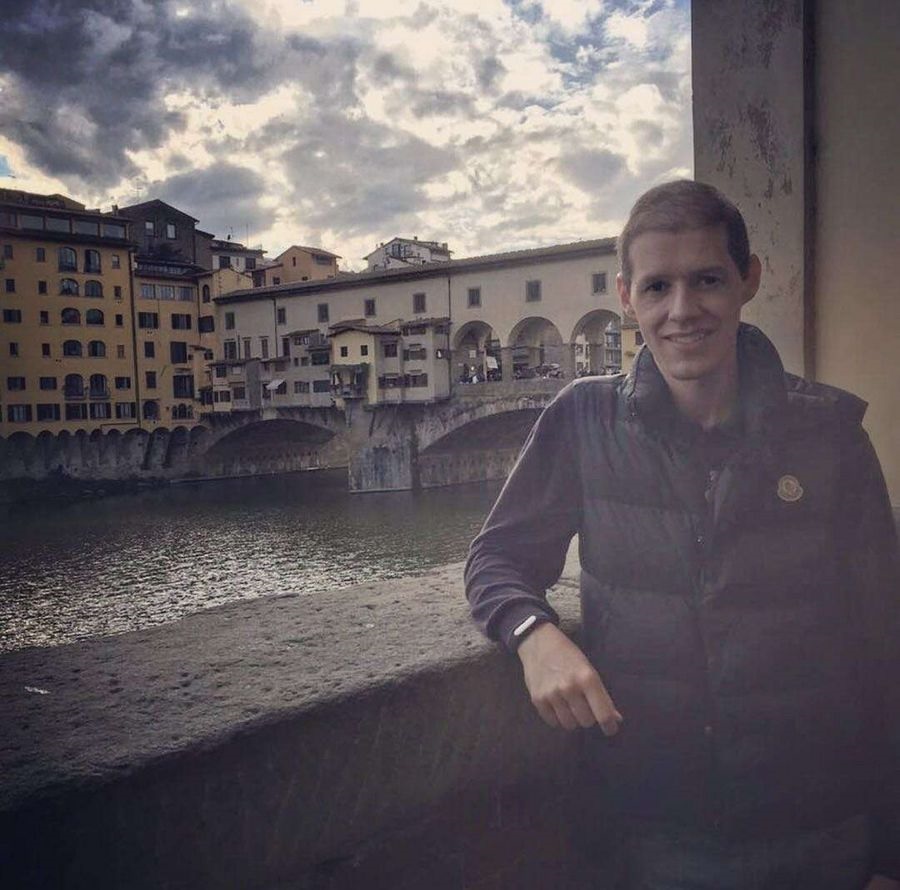
Matteo Giovannini in Florence, Italy in October 2019 during China's National Holiday period, which was his last trip out of China before the COVID-19 outbreak. (Photo provided by Matteo Giovannini)
Italy reported more than 10,000 confirmed cases on March 11, the day when the World Health Organization declared COVID-19 as a "pandemic." At the time of writing, more than 2.71 million infections and 190,000 deaths have been registered worldwide, according to the latest tally by Johns Hopkins University.
"Having observed the spread (of the virus) in other countries and comparing China's intervention with that of other countries, I have started to think that extreme measures were a necessary sacrifice," Giovannini said.
Drawing upon China's hard-earned lessons and measures which contributed to the reduction of new cases and large control of the epidemic, Italy has entered a month-old nationwide lockdown since March 10 under a government decree signed by Prime Minister Giuseppe Conte.
Giovannini's parents, who live in a relatively safe region in northeastern Italy as the local government has taken precautionary measures well before the rest of the country, are in self-isolation and only allowed to go out and buy food at the nearest supermarket.
Meanwhile, he keeps in touch with his friends back in Italy through social media and constantly shares his life experiences with them during this difficult period of time.
"My friends are not very used to wearing masks as we normally do here in Asia," said Giovannini. "I make them understand that it is a necessary precaution to avoid the contagion."
"One aspect that Italy should definitely learn from China is the respect for discipline," said the Italian, adding this challenging public health crisis calls for "an extraordinary effort from every person at every level."
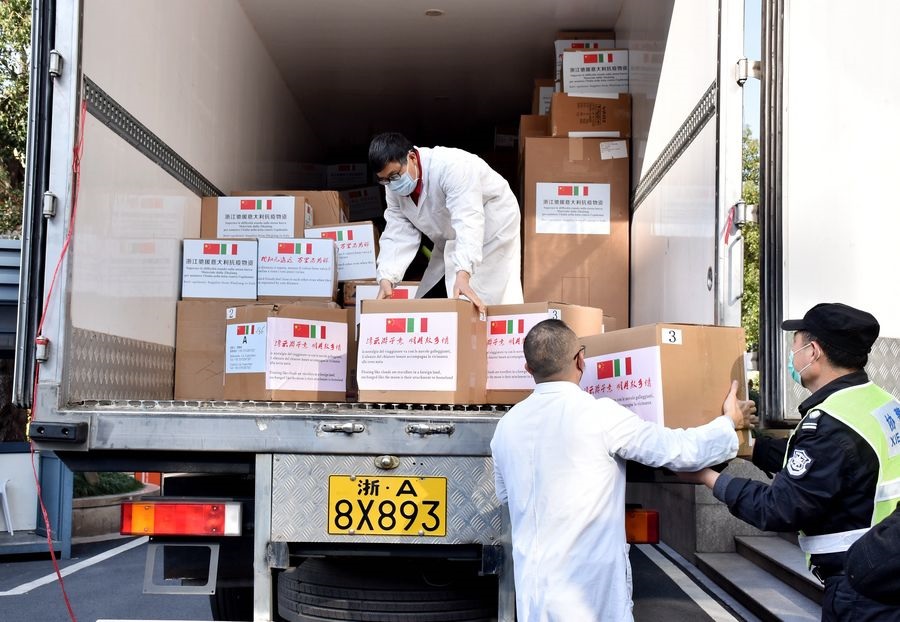
Staff members load Chinese medical materials for Italy at Zhejiang Provincial People's Hospital in Hangzhou, east China's Zhejiang Province, March 17, 2020. (Xinhua)
Stronger China-Italy ties
As the epidemic worsened in Italy, Giovannini, assuming his role at the China Task Force, has tried to facilitate the channel of donations from companies and people in China to Italy, helped establish a connection between donors and the Italian Embassy in China, and advised them on the best way available to offer help.
"The institutional channel is currently the safest way to be successful in the delivery at a time when borders are closed and controls at customs could delay or never guarantee the successful delivery of donations," he said.
China, while putting up an arduous fight against the epidemic at home, has made utmost efforts to help Italy contain the coronavirus outbreak.
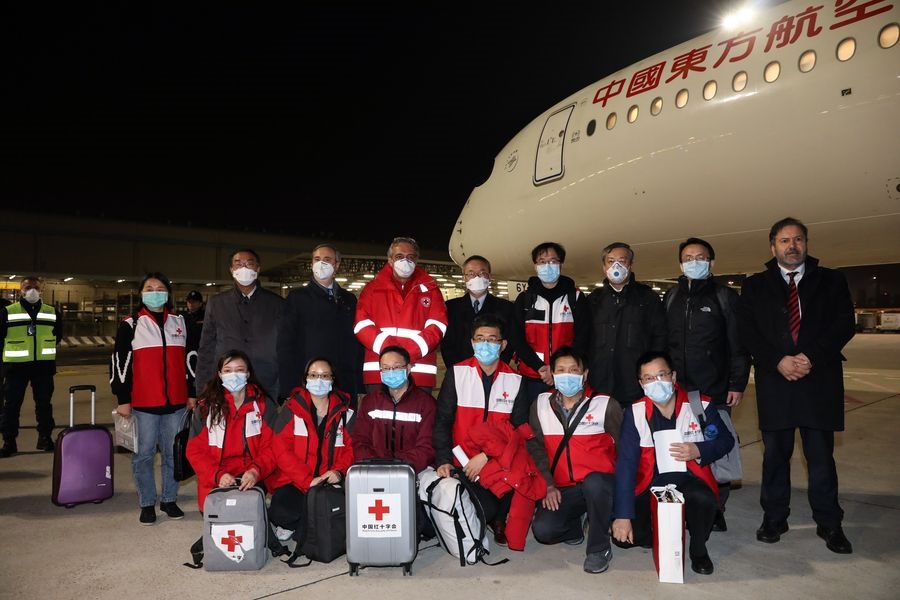
Chairman of Italian Red Cross Francesco Rocca (6th R, back) poses for photos with members of Chinese aid team at Fiumicino Airport in Rome, Italy, March 12, 2020. (Xinhua/Cheng Tingting)
On March 12, a charter flight carrying a nine-member Chinese aid team, along with medical supplies, arrived at Rome's Fiumicino Airport. Among the team were four medical experts and one Italian-language lecturer from southwestern China's Sichuan Province.
"It has been wonderful to see Sichuan doctors arriving in Italy to help Italian people," Giovannini said, recalling that Italy had sent 14 doctors to dash in and help when Sichuan was struck by a massive earthquake in 2008. "This speaks more than words about the friendship between the two countries."
Showing their appreciation for China's assistance amid a national lockdown, Italians chanted "Grazie Cina" ("Thanks China") from their balconies and windows, a scene shown in a short video which went viral on the Internet in China.
On March 16, Chinese President Xi Jinping said that China would send more medical experts to Italy and do its best to provide Italy with medical supplies and other assistance in a phone conversation with Prime Minister Conte.
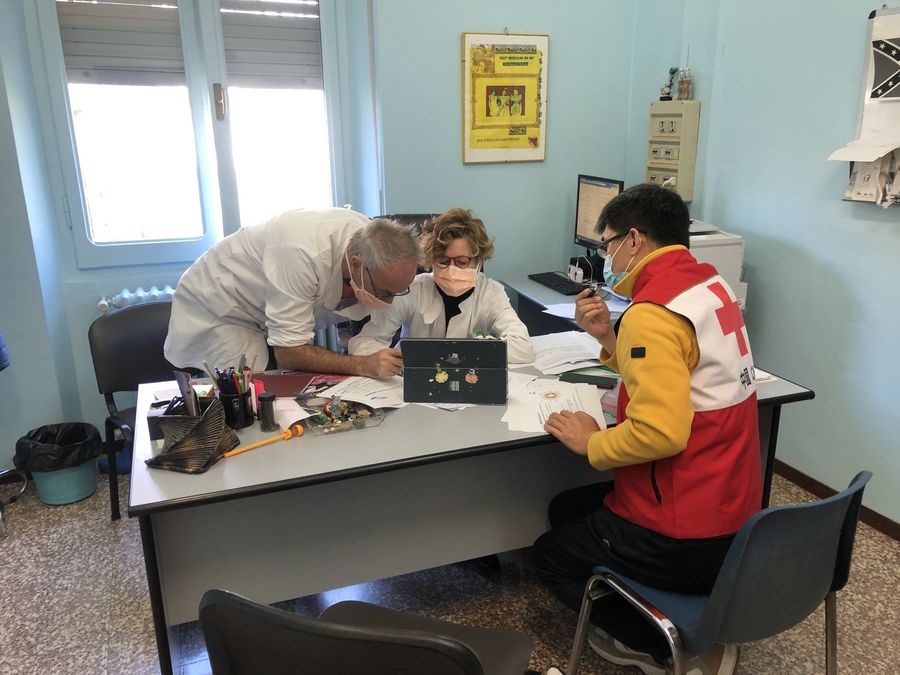
A member of the Chinese medical team talks with medics working at the Pavia hospital in Pavia, Italy, March 21, 2020. (Xinhua)
In March last year, China and Italy signed a memorandum of understanding to jointly advance the construction of the Belt and Road Initiative during Xi's state visit to Italy, making Italy the first European country and Group of Seven nation to join the infrastructure plan proposed by Xi for global interconnectivity.
The signature deal, coupled with their joint fight against the virus, cannot be a more fitting example of close bilateral ties as the two countries celebrate the 50th anniversary of the establishment of diplomatic relations this year.
"I strongly believe in the relationship between these two countries," said Giovannini, who regards himself as "a bridge between the two cultures and peoples." "After the coronavirus is gone, Italy and China will see their ties become even stronger."
On April 8, the 76-day lockdown was finally lifted on Wuhan. Spring has come to the city, and the smell of hot dry noodles, a local dish, is once again wafting through the streets.
Across China, businesses have been resuming operation in an orderly fashion. People are stepping out of their homes, but wearing masks out of fear of contagion. Parents are taking their children outdoors for a quick breath of fresh spring air.
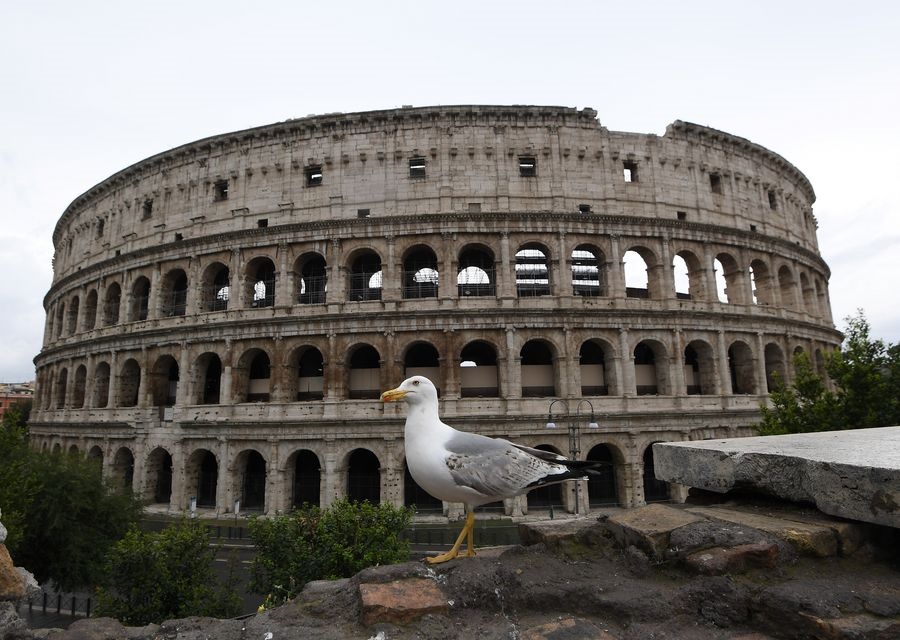
A seagull stands in front of the Colosseo in Rome, Italy, on April 21, 2020. (Photo by Alberto Lingria/Xinhua)
Meanwhile, Italy's lockdown appears to have slowed the spread of the coronavirus. As the number of people in intensive care units has declined and daily deaths are trending down, the Italian government has extended the lockdown to May 3 with the prospect of a gradual restart of normal life after that date.
Confident that "the light at the end of the tunnel is not that far," Giovannini would like this pandemic to end "as soon as possible." Once the crisis is over, among the first things he wants to do is to dine in his favorite Italian restaurant in Beijing, watch a movie on the big screen, grab his tennis racquet and go back to his old sports routine.
Besides, he is yearning to travel with his wife to visit his family in Italy and explore the world further. "There are still so many places to see on my wish list," he said.
Source: Xinhua News Agency